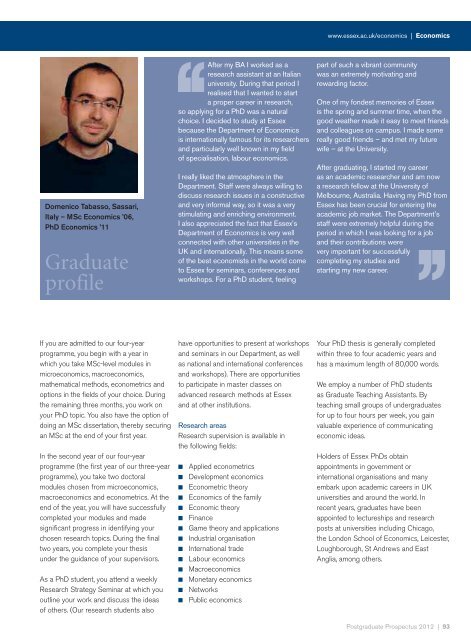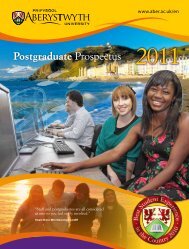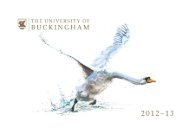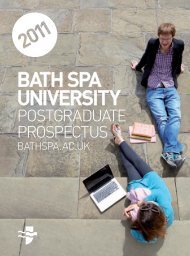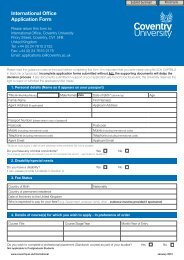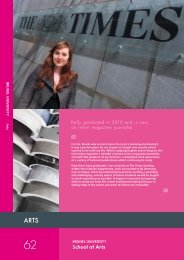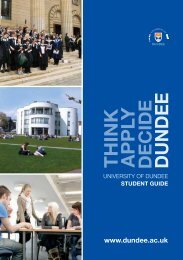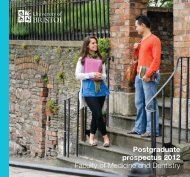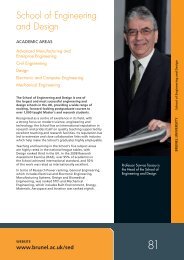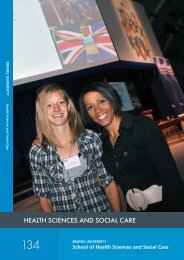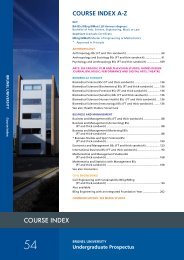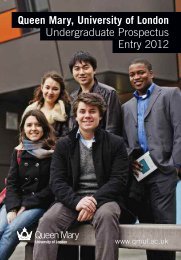Postgraduate Prospectus
Postgraduate Prospectus
Postgraduate Prospectus
You also want an ePaper? Increase the reach of your titles
YUMPU automatically turns print PDFs into web optimized ePapers that Google loves.
www.essex.ac.uk/economics | Economics<br />
Domenico Tabasso, Sassari,<br />
Italy – MSc Economics ’06,<br />
PhD Economics ’11<br />
Graduate<br />
profile<br />
After my BA I worked as a<br />
research assistant at an Italian<br />
university. During that period I<br />
realised that I wanted to start<br />
a proper career in research,<br />
so applying for a PhD was a natural<br />
choice. I decided to study at Essex<br />
because the Department of Economics<br />
is internationally famous for its researchers<br />
and particularly well known in my field<br />
of specialisation, labour economics.<br />
I really liked the atmosphere in the<br />
Department. Staff were always willing to<br />
discuss research issues in a constructive<br />
and very informal way, so it was a very<br />
stimulating and enriching environment.<br />
I also appreciated the fact that Essex’s<br />
Department of Economics is very well<br />
connected with other universities in the<br />
UK and internationally. This means some<br />
of the best economists in the world come<br />
to Essex for seminars, conferences and<br />
workshops. For a PhD student, feeling<br />
part of such a vibrant community<br />
was an extremely motivating and<br />
rewarding factor.<br />
One of my fondest memories of Essex<br />
is the spring and summer time, when the<br />
good weather made it easy to meet friends<br />
and colleagues on campus. I made some<br />
really good friends – and met my future<br />
wife – at the University.<br />
After graduating, I started my career<br />
as an academic researcher and am now<br />
a research fellow at the University of<br />
Melbourne, Australia. Having my PhD from<br />
Essex has been crucial for entering the<br />
academic job market. The Department’s<br />
staff were extremely helpful during the<br />
period in which I was looking for a job<br />
and their contributions were<br />
very important for successfully<br />
completing my studies and<br />
starting my new career.<br />
If you are admitted to our four-year<br />
programme, you begin with a year in<br />
which you take MSc-level modules in<br />
microeconomics, macroeconomics,<br />
mathematical methods, econometrics and<br />
options in the fields of your choice. During<br />
the remaining three months, you work on<br />
your PhD topic. You also have the option of<br />
doing an MSc dissertation, thereby securing<br />
an MSc at the end of your first year.<br />
In the second year of our four-year<br />
programme (the first year of our three-year<br />
programme), you take two doctoral<br />
modules chosen from microeconomics,<br />
macroeconomics and econometrics. At the<br />
end of the year, you will have successfully<br />
completed your modules and made<br />
significant progress in identifying your<br />
chosen research topics. During the final<br />
two years, you complete your thesis<br />
under the guidance of your supervisors.<br />
As a PhD student, you attend a weekly<br />
Research Strategy Seminar at which you<br />
outline your work and discuss the ideas<br />
of others. (Our research students also<br />
have opportunities to present at workshops<br />
and seminars in our Department, as well<br />
as national and international conferences<br />
and workshops). There are opportunities<br />
to participate in master classes on<br />
advanced research methods at Essex<br />
and at other institutions.<br />
Research areas<br />
Research supervision is available in<br />
the following fields:<br />
n Applied econometrics<br />
n Development economics<br />
n Econometric theory<br />
n Economics of the family<br />
n Economic theory<br />
n Finance<br />
n Game theory and applications<br />
n Industrial organisation<br />
n International trade<br />
n Labour economics<br />
n Macroeconomics<br />
n Monetary economics<br />
n Networks<br />
n Public economics<br />
Your PhD thesis is generally completed<br />
within three to four academic years and<br />
has a maximum length of 80,000 words.<br />
We employ a number of PhD students<br />
as Graduate Teaching Assistants. By<br />
teaching small groups of undergraduates<br />
for up to four hours per week, you gain<br />
valuable experience of communicating<br />
economic ideas.<br />
Holders of Essex PhDs obtain<br />
appointments in government or<br />
international organisations and many<br />
embark upon academic careers in UK<br />
universities and around the world. In<br />
recent years, graduates have been<br />
appointed to lectureships and research<br />
posts at universities including Chicago,<br />
the London School of Economics, Leicester,<br />
Loughborough, St Andrews and East<br />
Anglia, among others.<br />
<strong>Postgraduate</strong> <strong>Prospectus</strong> 2012 | 93


